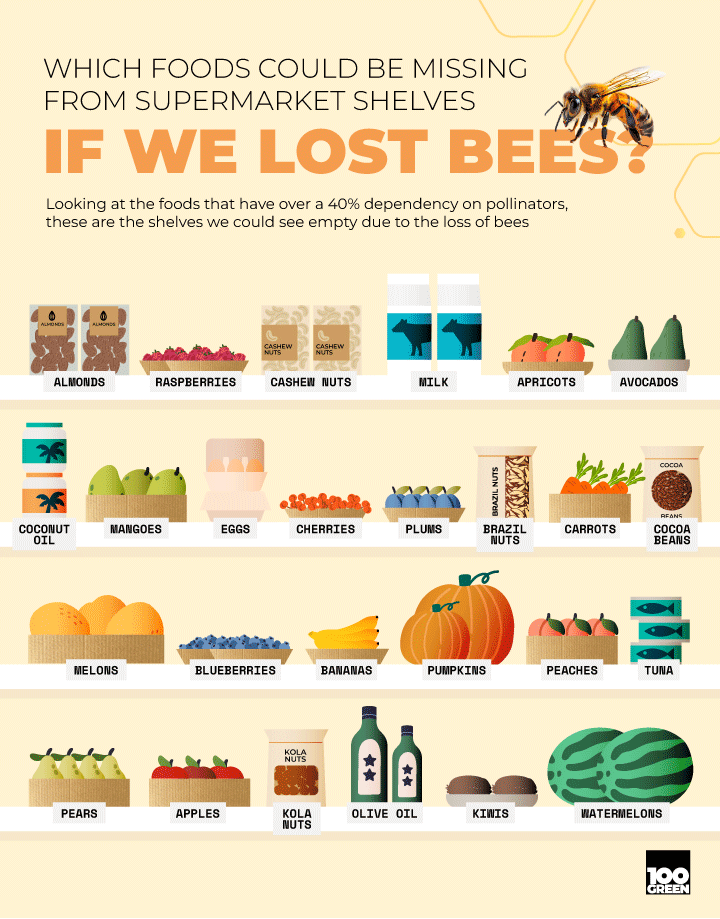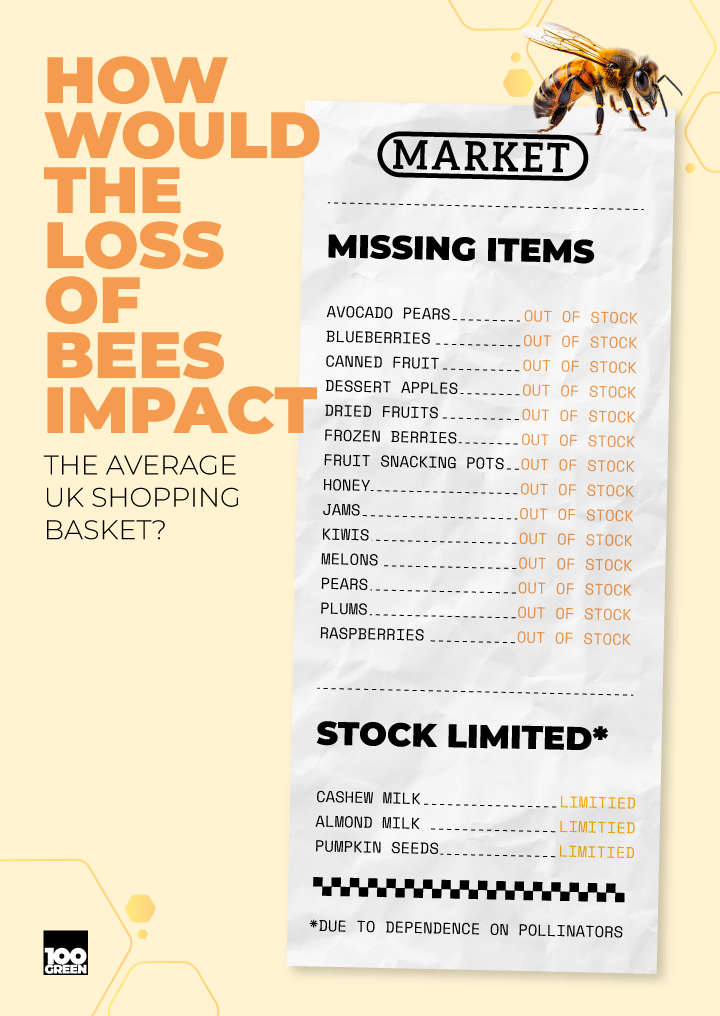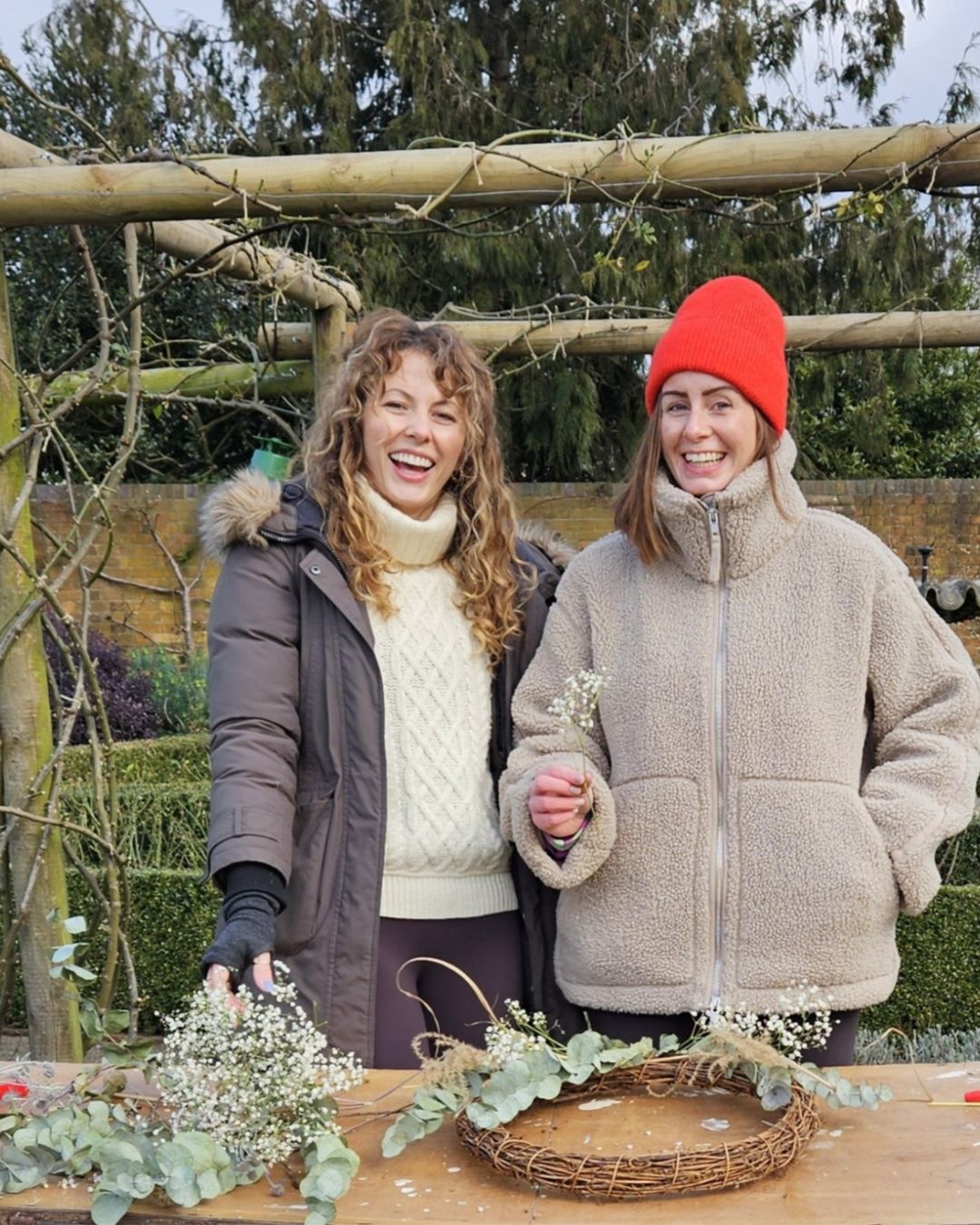When it comes to spring and summer, we start to see all the wildlife come out, from butterflies to ladybirds, and one of perhaps the most well-known insects—bees.
However, the bee population is declining in the UK, with things like habitat loss, pesticides, and climate change all contributing to negative effects for British bees. In fact, a WWF study found that 17 species had gone regionally extinct in the east of England, proving that the problems for native bee species is a real concern.
This problem isn’t new, we’ve all heard the phrase “save the bees” before, but why are bees important? And what exactly do they have an impact on for the rest of the planet and for the UK population?
Well, we at 100Green have surveyed 1,000 UK adults to see what their understanding is when it comes to bees and pollinators, and crunched the numbers of how our usual supermarket shops would be impacted by their loss.
What do bees do?—1 in 5 UK adults aren’t sure

When asked about their thoughts on British bees, our survey found that two-thirds (69%) of UK adults are worried about losing bees.
Older adults are more likely to be worried about the loss of bees, as three-quarters (78%) of over 65 year olds are worried, versus only 56% of 18-24 year olds.
However, UK adults don’t quite understand the impact of bees, as one in five (21%) say they don’t understand how bees affect the planet.
In addition to this, only four in five (80%) believe that bees in the UK are important for our ecosystem.
We also found that just half (57%) of 18-24 year olds believe that bees are important to the ecosystem, suggesting that younger adults need some more education on bees' roles in our ecosystem and our planet.
Why are bees important?
So, why are bees essential for our day to day lives?
Well, UK Gov reports indicate that bees are fundamental to food production, and contribute around £500 million a year to UK farming and food. Bees, and other pollinators such as wasps and beetles, pollinate UK fruits, with some supermarket favourites dependent on the insects for growth.
To see how this would affect our everyday lives, we analysed different food groups to look at their dependency on pollinators.
If we were to lose bees and other pollinating insects, those with a high dependency on pollinators could be at risk of disappearing from our shelves and ecosystems. We found that this includes items such as almonds, blueberries, mangoes, and even pumpkins—meaning some Halloween traditions and recipes would be at risk.

In fact, when looking at the average UK shopping basket, we would lose 10% of the usual products that we buy if we were to lose bees.
However, the loss of bees would greatly impact our fruit and nuts intake, as these are the areas most dependent on pollinators.
When looking at the standard UK basket, our analysis found that half (54%) of the fruit in the average UK supermarket shop has a ‘high dependency’ on pollinators, meaning we could lose these popular items.
When looking at the importance of bees, and the impact their loss would have on our weekly shop. UK families would lose access to commonly bought items such as kiwis, raspberries and melons. With items such as jams and, obviously, honey also being lost without bees.
Some items in our standard basket have a less high dependency on pollinators, but would be still be impacted such as:
- Cashew milk (due to the cashews dependence on pollinators)
- Almond milk (due to the almonds dependence on pollinators)
- Pumpkin seeds

How the loss of bees could impact our health
And when it comes to potentially losing these fruits, this also impacts our health and vitamin levels, with vitamin C at the most risk.
As such, we spoke to Dr Rimas Geiga, Registered Dietician, Clinic Nutritionist (RDN) at Glow Bar London about how important Vitamin C is and how inadequate levels can impact us:
“I cannot overstate the importance of vitamin C in human health. This nutrient is not merely an immune booster. It’s also a biochemical necessity for multiple physiological functions. Unlike many animals, humans lack the enzyme required to synthesize vitamin C, making dietary intake essential.
“One of its most critical roles is in collagen synthesis. Without adequate vitamin C, collagen production declines, leading to fragile skin, weakened blood vessels, and impaired wound healing. I stress that this is not a cosmetic issue but a structural one, affecting everything from bone integrity to cardiovascular function. Deficiency has been linked to an increased risk of aneurysms and arterial damage, emphasizing its role in vascular health.
“Vitamin C is also a key player in iron absorption. Iron deficiency anemia, particularly in plant-based diets, can often be traced to inadequate vitamin C intake rather than iron itself. It enhances non-heme iron absorption, making it indispensable for individuals with dietary restrictions.
“Clinically, I find that subclinical vitamin C deficiency is often overlooked. Fatigue, irritability, and slow recovery from infections are early signs, yet they are frequently misattributed. A deficiency does not manifest overnight but develops gradually, undermining long-term health. This is why I insist that consistent intake is non-negotiable.”
So it’s clear that bees' impact on our dietary and health requirements can be huge, especially if we lost half of the fruits the UK tends to buy from our supermarkets.
What can I do to help the bees?

We partnered up with floral experts Peony & Pose to find out how we can all do our bit to save the bees, including the best flowers for bees, and how to create a bee garden at home and encourage wildlife.
Top tips from Peony & Pose
1. Plant tasty treats for you and the bees
The first step to encouraging wildlife to your garden is to choose some bee friendly plants.
So, what do bees eat? Well, they actually are fond of our herbs. If you leave your outdoor herbs like mint, thyme and oregano to flower, the bees can enjoy them too!
2. Get a variety of colour and style
Planting lots of different flowers and plants in your garden is great for UK pollinators, as it gives them a variety to feed on.
If you have a vegetable garden, planting various flowers is a great way to increase your crop, and manage any weeds, making it beneficial for both you and the bees!
When it comes to choosing your flowers for bees, bees can see purple better than any other colour, so flowers like catmint, scabious, lavender, verbena and alliums are perfect for them.
3. Plan your garden in advance
Some bees can emerge as early as February, so don’t forget to get your spring bulbs, like crocus and daffodils, planted in autumn. Head to oursmall sustainable garden ideas blog to see how you can display your spring bulbs in a creative way.
4. Stay away from pesticides
Using pesticides to keep weeds and nuisance insects out of your garden can seem like an easy, quick fix–but these chemicals are not only bad for your plants but also for any wildlife.
Instead of toxic pesticides, you can pull weeds by hand if needed, and use preventative measures for insects such as slugs.
5. Stick to easy plants if you’re a new gardener
If you’re new to gardening, have no fear, lots of flowers are easy to grow and maintain. Sunflowers are a great flower for the whole family to enjoy, and it’s always a good way to have some healthy competition!
One of the key plants for bees, lavender, is hardy and works well in pots, plus smells great.
Choosing native flowers will give you a good chance of success: Foxgloves are a quintessential flower for an English garden, bees love their tubular shape, and they can thrive in many conditions such as full sun and shade.
How to save a bee in your garden
If you spot a tired bee, you can also do your best to give it some first aid.
You’ll usually see a tired bee on a pavement or grass, and there are some simple steps to help them on their way.
Gently pick the bee up with some paper or a leaf and put him somewhere safe. You can put the bee on a flower to see if it’ll go for the pollen, but they might be too tired to do this.
If they won’t feed from the flower, you can mix together some sugar and warm water to feed the bee yourself. Put a few drops of the mixture directly next to the bee, and you should be able to see their tongue come out to lick it.
Your sugar and water mixture should hopefully make the bee feel energised again, leaving him to buzz around your garden.
There are also bee conservation organisations in the UK, such as The Bumblebee Conservation Trust and The Bee Conservatory, that you can get involved with directly if you want to help more bees across the UK.
Our methodology:
The "A World Without Bees" campaign first analysed global food production data from the World in Data to identify the extent to which it relied on pollinators, followed by correlating these findings with the UK's Office for National Statistics (ONS) basket of goods. This approach quantified the proportion of essential items in the average UK shopping basket that were pollinator-dependent(40%+), highlighting specific foods that would become scarce without pollinators. Additionally, the campaign examined the potential nutritional deficits in the UK diet by identifying crucial nutrients provided by these foods, illustrating the significant health and dietary impacts of a decline in pollinator populations.